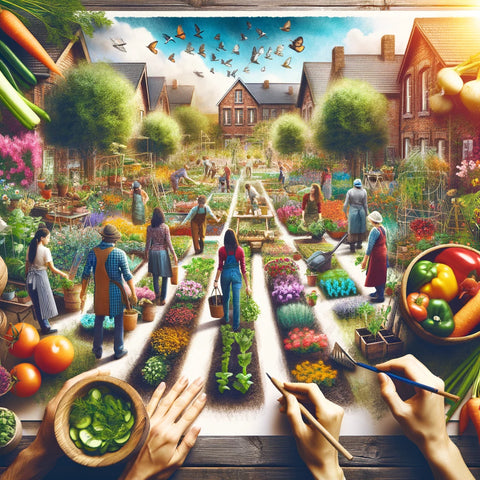Cultivating Community: The Transformative Power of Garden Projects
Community garden initiatives are hubs of sustainability, education, and cooperation, not to mention places to raise food. A feeling of community and shared purpose, as well as a desire to nurture the planet, link individuals from many walks of life in these gardens. Working on community garden initiatives has been an eye-opening experience that has taught me many things, including the significance of collaboration, the need for more green space in cities, and the positive effects of gardening on both human and environmental health.
A Foundation for Unity
A common starting point for community gardens is the simple desire to provide life and purpose to an underutilized or abandoned area. As time goes by, more and more people—neighbors, friends, and members of community groups—join forces to make these shared areas a reality. As people work together to plant a garden and then share what they've learned, what they have, and what they've harvested, a powerful feeling of community is born.
An Eco-Friendly Learning Environment
Gardening in a community garden is like having a never-ending school of life lesson right in your own backyard. They teach youngsters practical lessons in nutrition, ecology, and biology. Whether it's the finer points of composting, the complexities of plant care, or the advantages of biodiversity, even adults may find ways to learn. In these gardens, sustainable techniques are not only taught but actively practiced, creating an environment that encourages experimentation and creativity.
Putting Sustainability into Practice
The importance of community garden initiatives in fostering sustainability is one of its most alluring features. The carbon impact of transporting food from the farm to the table is reduced by growing it locally in these gardens. In addition to lowering temperatures, enhancing air quality, and providing a home for pollinators, urban parks also function as little green spaces. Community gardens are even more beneficial to the environment when they incorporate composting, rainwater collection, and organic pest control strategies.
Advantages to Society and Health
Community gardens are great for more than just the environment; they also improve people's social and psychological wellbeing. In these gardens, people of all backgrounds come together to celebrate cultural customs and make new acquaintances. Gardening is a kind of self-care that has several health benefits, including relieving stress and improving emotional and physical well-being. Fresh, healthy food is sometimes hard to get by in metropolitan settings, but community gardens can alleviate that problem.
Struggles and Achievements
Obtaining land, money, and overcoming regulatory hurdles are just a few of the obstacles that community garden programs encounter, despite the numerous advantages. Despite this, the successes much exceed the setbacks. The perseverance and commitment of gardeners are shown by every flourishing garden. Gardening is about more than simply growing food; it also brings people together, helps them feel more connected to the land, and gives them hope for the future.
Projects like community gardens demonstrate how even modest efforts may have a profound impact. Greener, more sustainable, and more interconnected communities are within our reach when we work together, as they serve as a reminder. We plant the seeds for a better, more sustainable future as we tend to these gardens, which strengthens the ties that bind us to one another and to the earth.






Leave a comment